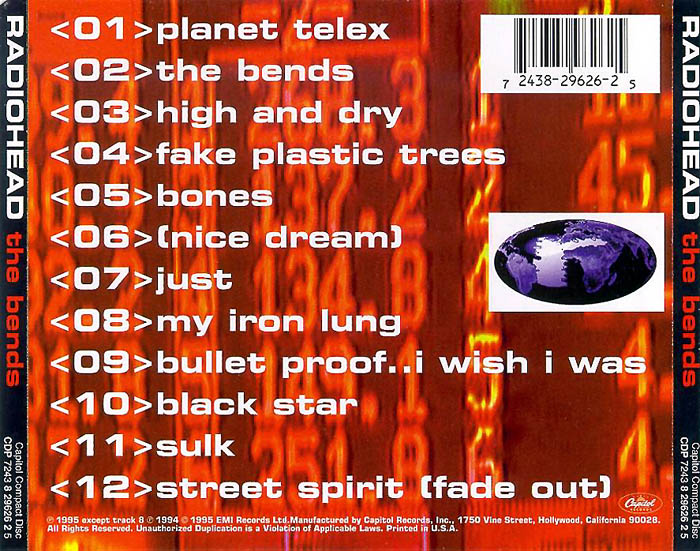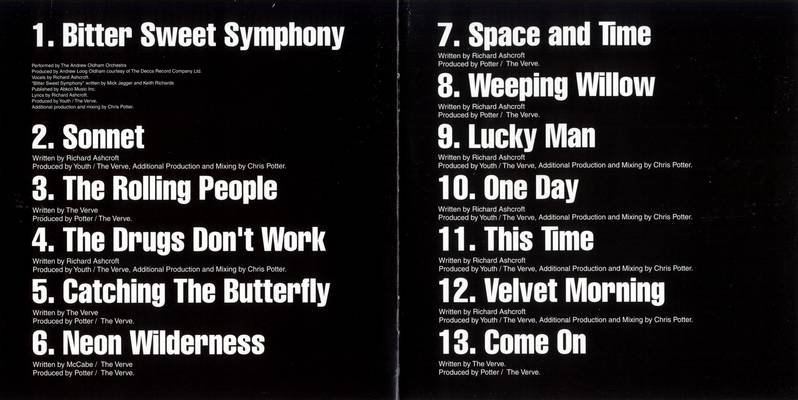The year is 1995. US space station Atlantis docks with the Russian station Mir. The DVD is announced as a new disk format. Toy Story sets the record for the first ever fully computer-generated film.
And Radiohead release “The Bends”. An important year for us, I’d say.
Radiohead crashed through the scene with a pivotal album that was hailed as the saviour of Rock. “The Bends” marked a radical change in the band’s style – the transition from the Britpop-influenced ‘Pablo Honey’ (1993) to the critically acclaimed post-rock opus ‘OK Computer’ (1997).

Before everything was in its right place.
I consider this album an important one in our times. It is a record laden with emotion and paranoia, exploring the human psyche in a way few have successfully done before. It paved the way for the behemoth Radiohead go on to be.
Brace yourself.
01. Planet Telex
The opener starts off with an upbeat, solemn, synthesized drum-loop. Groovy bass, fuzzy distorted guitars join in. “You can force it, but it will not come” is how Thom Yorke sets it off. The chorus screams hopelessness. They say Thom was a mess on the studio floor, and he sang this into a mic. Not a very subtle track at all.
02. The Bends
Title track. The essence. One of Radiohead’s more anthemic tracks, the title denotes what the band was going through after to the unprecedented success of Pablo Honey. The Bends is a situation faced by divers. When a diver swims to the surface too fast, nitrogen compression begins paralysing his limbs. Now there’s the dilemma – he can’t swim too fast, he’ll only immobilize faster; neither can he stay low and drown. This kind of conflict pretty much sums up the soul of the album. An intricate 3-layer guitar attack by Thom, Ed, and Jonny. Go nuts.
03.High and Dry
The “poppiest” song RH ever made. Radio stations loved it, playing it over and over again, while Thom probably snickered somewhere wondering why sarcasm is so difficult to comprehend. Ambiguous lyrics give way to interpretations ranging from a drug-addicted, solitary sufferer’s tale; to the psyche of a person who tries too hard to be someone he can’t. And the song describes, beautifully, the ultimate end of those tales. Read between the lines, but might I add this is probably as far as pop can go. With the odd track in an otherwise non-mainstream album, Thom makes his point. Pop sells.
04. Fake Plastic Trees
Along with Street Spirit, my favourite on the album. Thom waxes poetic with lines such as “gravity always wins” /”She looks like the real thing, she tastes like the real thing, my fake plastic love.” Using his trademark falsetto throughout. he ponders what love today means. But then it could also be about the crud that builds up in society, due to mass production of plastic… Radiohead are unparalleled when it comes to not restricting a song’s meaning. The more you listen, the more you build moments in your mind. Profound, and rated 376 by Rolling Stone magazine on the list of the 500 greatest songs of all time.

Read between the smiles.
05. Bones
“And cant you feel it, in your bones?”
06. Nice Dream
Dreamy. Thom sounds lazy like he’s just woken from an exotic dream, due to the acoustics of the song. “They love me like I am their brother… they protect me, make me happy” he muses.

Press release, Japan.
07. Just
Said to be a competition between Thom and Jonny – how can one squeeze an astonishing number of chords in a song, and still make it awesome? Has a couple Jonny© Greenwood™ lightning fast solos, and the multi-layered sound Radiohead pioneered. Phil drums with precise, tasteful beats. Does he an atomic metronome in his head, is a question that needs to be answered.
08. My Iron Lung
Radiohead rebel their angst with being cornered into one-hit-wonders here.
09. Bulletproof… I wish I was.
Ballad-like, mesmerising. Don’t miss the ringing-chiming guitar when the chorus comes in.
10. Black Star
Broke? Girlfriend dumped you? Mugged by thugs? “Blame it on your Black star. Blame it on your falling Sky“. Thom’s falsetto never fails.
11. Sulk.
The only weak track on the album. Why is it here?
12. Street Spirit (Fade Out)

“Immerse your soul in love.”
I’m overwhelmed every single time I hear ‘Fade Out’. Thom exalts the darkness that encompasses life, the darkness that we train ourselves to avoid, immunize ourselves against. Every Radiohead song is known to have a silver lining, a ray of hope. This one is the exception.
“Cracked eggs, dead birds, scream as they fight for life. I can feel death, can see its beady eyes” – the song is haunting. And once the high pitched chorus comes, Thom reveals his ability to sustain high notes like no other. Revolving around a crushing arpeggio in A-minor, ‘Street Spirit’ demonstrates how beautifully simple music can be the most difficult to create. Everything fits gapless, like pieces of a jigsaw only meaning something when they coalesce. There’s nothing you feel you could take from this song and nothing you could add to it. Very few musicians ever achieve this.
‘The Bends’ is so much more than the sum of its parts. Dive into this album headfirst, unflinching. Take it in. I could ramble about it for ages, but you’ll only know when you hear it for yourself.

Tracklist















